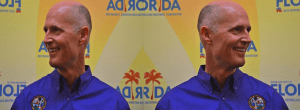
Gov. Rick Scott said in media interviews Wednesday that the state must consider adding early voting days and shortening the ballot to avoid the long lines that plagued elections in some counties this year.
Scott also suggested in interviews on CNN and WNDB radio in Daytona Beach that local supervisors of elections should have more flexibility on polling locations in order to allow for more voting machines where they’re needed.
But the most surprising thing the Republican governor suggested may be that he and GOP legislators may have erred in reducing the number of early voting days from 14 to 8 for the 2012 elections.
“We’ve got to go back and look at the number of days of early voting we have,” Scott said on CNN’s Starting Point with Soledad O’Brien.
“People are frustrated in our state,” Scott said. “We’ve got to restore confidence in our elections.”
Scott signed the law in 2011 that reduced the number of voting days, though when asked on CNN whether that meant he bore some of the blame, Scott replied that he simply followed the law.
“I comply with the law,” Scott said. “But we do need change.”
Scott said he wanted a bipartisan group to look at the number of early voting days, but wasn’t specific on CNN or in the later radio interview about how many more days he thinks might be needed.
And in the interview on WNDB radio he suggested that it wasn’t a given that more days are needed – saying only that investigation is needed to see if that’s the case.
“We need to look at early voting days to see if we need to add more days,” Scott said. He also acknowledged the number of critics who have suggested that possible solution. “We need to listen to the citizens of the state,” Scott said. “They come up with the best ideas.”
Scott also said the long ballot was part of the problem. He pointed specifically to the 12-page Miami-Dade ballot, which was loaded down with local issues in addition to statewide races, legislative and judicial races and 11 constitutional amendment questions.
“Twelve pages… this took some people 40 minutes to get through,” Scott said. “It was just too long.”
Scott’s interviews came as former Gov. Charlie Crist – who as a GOP governor in 2008 expanded early voting times by executive order, angering his fellow Republicans – told the U.S. Senate Judiciary Committee that lawmakers should err on the side of allowing as many people as possible to vote. Crist has since become a Democrat, and is seen as a possible challenger to Scott in 2014. The Judiciary Committee held a hearing Wednesday on “the state of the right to vote.”
Crist suggested Florida should return to 14 days of early voting instead of 8 and also suggested that national standards on early in-person voting might be worth studying.
Overall, Crist said generally making it easier to vote, rather than harder, is the way to go.
“America wins and democracy thrives when more people vote,” Crist said. In considering any changes to voting laws, Crist suggested that policymakers should “just be respectful to the voters.
“Allow them to exercise this wonderful opportunity and privilege that we have in America to choose our leaders,” Crist said.
Also speaking to that panel, Democratic U.S. Sen. Bill Nelson of Florida alleged that the 2011 law that reduced early voting and made other changes that some said made it harder to cast a ballot was done intentionally to reduce turnout among Democrats – a charge backers of the plan have stridently rejected.
The law, Nelson said, was “clearly designed to disenfranchise likely Democratic voters.”
Backers of the 2011 law said they were targeting fraud in tightening the voter identification rules and that the effort to reduce early voting days was aimed at cutting costs.
by David Royse



[…] to deny ex-felons their right to vote including some who voted in 2008, and was forced to do an about-face on cutting early voting days and opportunities. On top of everything else, Rick Scott continued his big giveaways for big […]